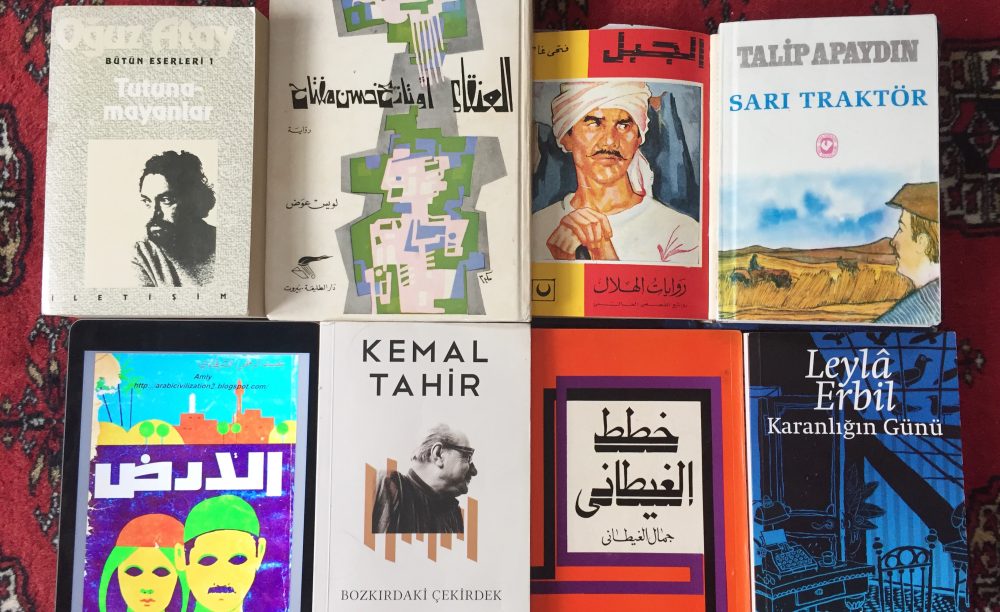KB
- Are you claiming that there is an evolution of sophistication between these novels?
- When looking at the difference between MSA and dialect, it will be more useful to focus on lexicon (look at corpus material), syntax may not provide enough material, you might want to focus on key vocabulary as a way to get at multivocality
SS
- What precisely are you arguing against? (gave common historiography about committed literature, maybe even more played out than I thought). There are already recent work in the last 10 years working to recuperate socialist realism (seems like the narrative I am working against isn’t specific or unchallenged enough)
- There seem to be two different possible tacts here, 1) there is just the updated conversation about the avant-garde vs. socialist realism that happened in 1920-1950 USSR, and all of the ways that that debate has been replayed over time.2) But then there is the idea of social formations changing syntax and the attempt to highlight these changes in the text i.o.w. the literary equivalent of economic changes. Which one is it? Sounds very much like the modernism/realism debate is way beyond played out, and should remain in the background.
- If looking at the political economy, at least for Egypt, it is of special importance to focus on the central role of cotton. Is there a way to think about literary debates and changes in political economy simultaneously?
- What is the actual intervention, what do you want to reshape?
- Language changing to describe changes in the countryside, then the city (forensics in a linguistic sense).
JO
- Chapter 3 – seem to be taking on a lot, many novels, should the MSA debate be separated out?
- Chapter 4 – no trauma studies included in the bibliography
- I seem to be depending a lot on secondary sources for the lit crit aspect of things. Need to find more newspapers and correspondance, no good plan for 1st person research, read more and gender and language
NE
- more systematic justification of what it is you are doing, are you looking at class or at power (the way you describe class seems to be closer to foucauldian power, need to be more explicit about the transformations both before and after the period 1950s-1980s
- lot of people I am intervening against seem sort of like a strawman
- maybe it’s a question of nationalist philology (not exactly sure what that meant)
- need a more systematic map and survey of the fields looking at to see what’s actually missing
- how do certain authors view their own work?
- what are the breaks from the past pre-1950s, how is it different or unique from Soviet case
- 50s-80s what new intervention what’s new about narration, what is revealed that is new, why this time period
- J Dean stuff is a shift of theoretical approach and political belief
- you should be looking more and country and city by WIlliams
final thoughts
- the warrant must be much clearer and stronger
- what is the state of the field that requires this intervention
- is it changes to language?
- is it changes in the political economy?
- is it the modernism/postmodernism debate (it shouldn’t be)
- what would you say to explain the importance of this work to someone not specifically interested in these novels, what would Jameson or Williams respond by saying “wow, I hadn’t thought of that”
- The Arabic and Turkish each have different sides when it comes to experience with language, MSA vs. left/right language ideology
- NATO vs. Soviet bloc as the global entry point for thinking about class and politics
- “the NATO novel vs. the Pan-Arab novel”
- These are Keynesian novels, state intervention as the framework, Soviet vs. NATO
- politics different because of this
- Keynesian era and its relationship to the state’s central role in policing language, there is this narrative that the state was the agent of linguistic change and that everything responded to it, that linguistic ideological rebellion was against the linguistic hegemony of the state, the state as producing a normative grammar to which everything else was a response, that there was standard language and then dialect, and that the novel was cast in this normative language. But these novels show language as imminant grammar, condensing all sorts of conflicts and power relationships, slipping between registers along a continuum, and that the line between fact and fiction is illusory.
conclusion
- there is a concern about framing
- thread language itself in the 1950s
- different agents who all contribute to the changes in language, not just state project
- one way to provide the historical background and context to the project could be the focus on changes in the language, make language change the historical object
- perhaps reframe as political ideology and language ideology for which the novels are a case study
- be precise about the intervention when you are saying something.
- When you mention a thinker’s name, or drop a keyword, you are inviting in that entire debate and will need to respond to it, be well-versed in it, if you mention Gramsci, you have to be able to speak in-depth about it, it’s not a tactic of being aware of everything, it’s about being stragetic about which frameworks you choose and knowing them thoroughly
- way to think of it what pisses you off? use that as a way to think about your intervention (mine so far have been strawmen)
- state language policy does not equal language ideology

